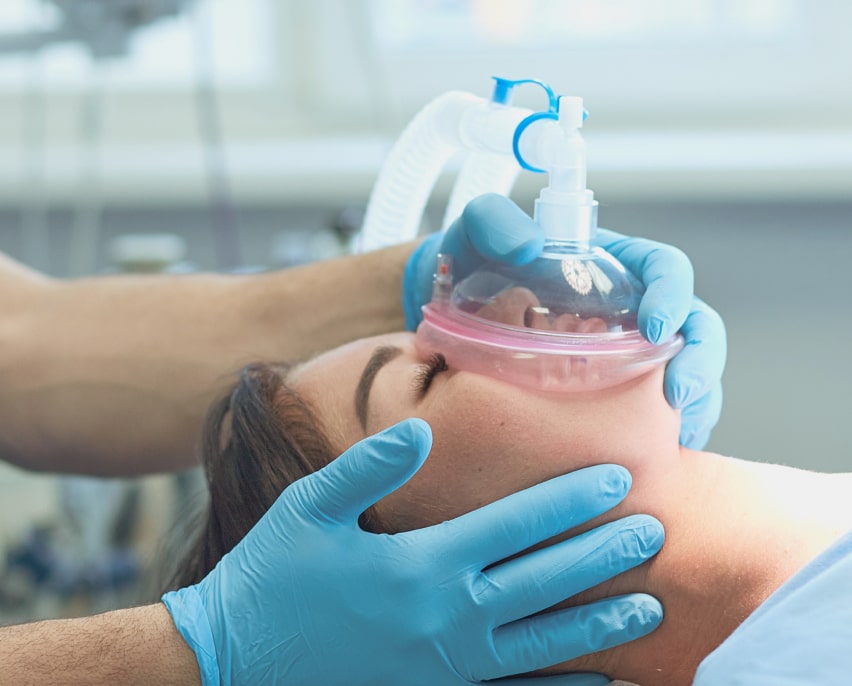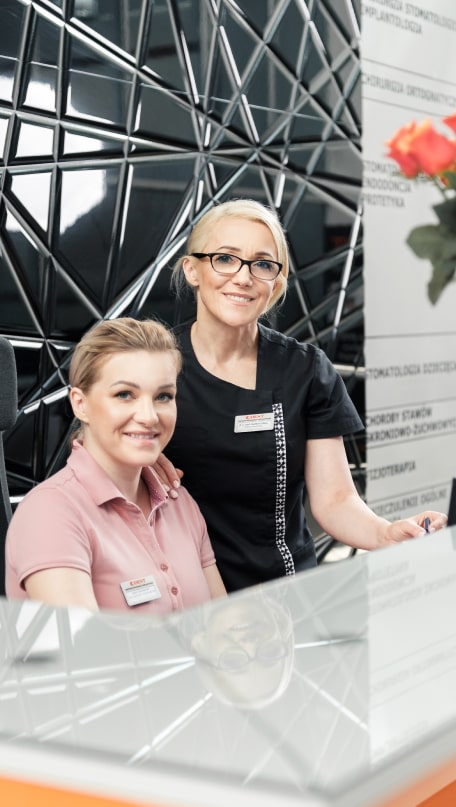DENTAL TREATMENT UNDER ANAESTHESIA
We treat teeth under anaesthetic using specialised equipment,

Anaesthesia in the Dental Clinic: Safety and Comfort during Procedures
Anaesthesia, a key component of many dental procedures, provides patients with comfort and safety. We aim to provide you with comprehensive care from the moment of consultation until you return home after your treatment.
What is
narcosis?
Anaesthesia is a process that deprives the patient of consciousness and the feeling of pain.
In our practice, we use general anaesthesia, which is safe and effective.

What it looks like
the anaesthetic process?
Prior to commencing general anaesthesia, a specialist anaesthetist will consult with the patient, analysing their medical condition and tailoring the anaesthetic plan to their individual needs.
In adult patients, anaesthesia begins with the insertion of a venepuncture into a vein through which drugs will be administered, under the influence of which the patient will fall asleep.
For young patients, anaesthesia is started by inhalation, minimising the stress of pricks and creating a child-friendly atmosphere.
Our team of experienced specialists ensures that every Patient, both large and small, is completely safe and comfortable during the procedure. Throughout the anaesthetic, the anaesthetist monitors vital functions, ensuring the safety of each Patient.
Preparation for
anaesthetics
Before the procedure, the patient must follow certain recommendations, such as not eating for a period of six hours before the anaesthetic, and not taking water for the last two hours. In addition, you must be assisted by a companion to help you get home after the procedure. Detailed instructions will be given during a telephone consultation with the anaesthetist.
For whom
anaesthesia?
General anaesthesia is dedicated to different groups of patients, both adults with dental anxiety and children. It is also an option for those who require long and complicated procedures.
Staff
medical
Our practice is staffed by experienced specialists who are concerned with the patient's safety and comfort during every procedure. Our team of anaesthesiologists and dentists provides comprehensive care at the highest level.
Frequently asked questions
o anaesthesia in general
What are the advantages of dental treatment under anaesthetic?
Comfort and anxiety reduction: For those suffering from dental anxiety, anaesthesia allows complex dental procedures to be carried out without experiencing fear or discomfort.
Painlessness of the procedure: General anaesthesia eliminates the pain and discomfort associated with dental procedures, as the patient is in a state of complete unconsciousness during treatment.
Implementation of multiple procedures in a single visit: With anaesthesia, multiple procedures can be carried out in one session, saving the patient time and reducing the need for multiple visits to the dentist.
Efficiency and effectiveness: For some patients, dental treatment under anaesthesia can be more effective, as it provides doctors with unobstructed access to the mouth and allows precise procedures to be performed.
Useful for special patients: People with physical or intellectual disabilities who have difficulty remaining calm during dental procedures can benefit from the advantages of dental treatment under anaesthetic.
Convenience and safety: Procedures under anaesthetic are performed under controlled conditions, ensuring both patient comfort and safety during the procedure.
How much does dental treatment under anaesthetic cost?
The cost of dental treatment under anaesthesia can vary depending on a number of factors, including: the type, complexity or length of the procedure. The cost can be significantly higher than normal dental procedures due to the additional costs associated with the use of anaesthesia and monitoring of the patient's condition.
Each patient has a consultation with the doctors in charge of the individual procedures before the procedure and receives a full cost estimate.
Is dental treatment under anaesthetic safe?
Dental treatment under anaesthesia is generally safe, but there are some risks that can occur, especially if not carried out properly.
All procedures using anaesthesia should be performed by experienced anaesthetists or medical staff qualified and experienced in general anaesthesia.
Here are some aspects concerning the safety of dental treatment under anaesthesia:
- Risk of allergic reactions: It is possible to have an allergic reaction to the anaesthetic drugs used or other ingredients used during anaesthesia. It is therefore important that the patient informs the doctor about his/her allergies and past allergic reactions.
- Risks associated with general anaesthesia: General anaesthesia carries some risks, especially for people with certain health conditions, such as heart or respiratory problems. Anaesthetists carefully assess the patient before anaesthesia in order to assess their health status and reduce the risks.
- Monitoring and control: During anaesthesia, the patient is constantly monitored to check his or her vital signs, such as blood pressure, heart rate, blood oxygen levels and other vital signs. This helps to ensure safety throughout the procedure.
- Experience of medical staff: The safety of dental treatment under anaesthesia depends largely on the skills and experience of the medical staff, including anaesthetists and dental staff. Qualified medical staff minimise the risk of complications.
It is important to remember that dental treatment under anaesthesia should be carefully considered and only recommended if there is a legitimate need or if another type of treatment is not suitable for the patient (e.g. due to dental anxiety or difficulty tolerating pain). Before deciding on dental treatment under anaesthetic, it is important that the patient discusses all his or her concerns and doubts with the dentist and anaesthetist.
Can children benefit from dental treatment under anaesthetic?
Yes, dental treatment under anaesthesia can be used in children, especially when there is a particular need due to the child's anxiety, stress or inability to cooperate during standard dental procedures. For many children, a visit to the dentist can be stressful and frightening, making dental procedures difficult.
Dental treatment under anaesthesia can be beneficial for children in the following situations:
- Extreme anxiety or dental phobia: Some children suffer from very severe dental anxiety or phobia, which prevents them from going through dental procedures calmly. General anaesthesia allows treatment to be carried out without stress or anxiety.
- The need for complex or painful procedures: For more complex or painful procedures, such as tooth extraction or root canal treatment, general anaesthesia may be considered to ensure the child's comfort and convenience during the procedure.
- Children with disabilities or neurological disorders: Children with certain disabilities or neurological disorders may have difficulty remaining calm or cooperating during dental procedures. In such cases, anaesthesia may be useful.
Dental treatment under anaesthesia in children requires special attention and care. Paediatric anaesthesiology is a specialised field of medicine where anaesthetists specialising in the care of children carry out anaesthesia in a safe and effective manner, ensuring that the child's condition is constantly monitored throughout the procedure.
However, the use of dental treatment under anaesthesia in children should only be carefully considered and recommended when there is a legitimate need and when other methods of treatment are not successful. In any case, the decision to use anaesthesia in a child should be made after consultation with a dentist and an anaesthetist specialising in the care of children.
We invite you to make use of our services and trust our experience. We are ready to provide you with safe and effective anaesthesia during your dental procedures. Contact us to arrange a consultation and find out more about our services.

Once you have completed the form, we will respond within 60 minutes during clinic hours.
-
Opening hours
Mon-Fri: 8:00 - 21:00
Saturday: 8:00 - 15:00
-
st. Grzybowska 85
00-844 Warsaw
